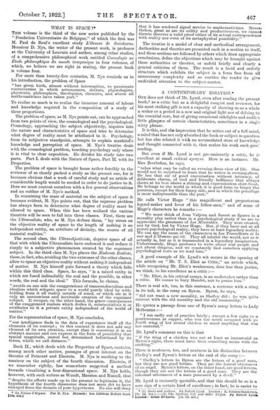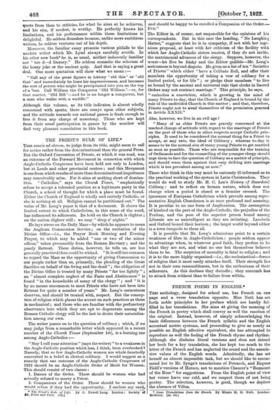A CONTEMPORARY ESSAYIST.*
ONE does not think of Mr. Lynd, even after reading the present book,' as a critic but as a delightful essayist and reviewer, for his most striking gift is not a capacity of showing us as a whole a writer or a period in a new and original light nor of delving to the essential core, but of giving occasional sidelights and suddea little glimpses of certain characteristics, sometimes in a sing) witty phrase.
It is this, and the impression that he writes out of a full mind, a mind that has not only absorbed the book or subject in question but has also related it with an accumulated store of knowledge and thought connected with it, that makes his work such gootl reading.
But even if Mr. Lynd is not pre-eminently a critic, he is excellent at small critical apercus. Here is an instance. Mr. Max Beerbohm, he says,
"takes what may be called an evening-dress view of life. One would not be surprised to learn that he writes in evening ,dress. He has that air of good conversation without intimacy, of deliberate charm, of cool and friendly brilliance that always shows at its best above a shining and expressionless shirt-front. He belongs to the world in which it is good form to forget the passions, except for their funny side, and in which the persiflage is more indispensable than the port."
He calls Victor Hugo "this magnificent and preposterous legend-maker and lover of his fellow-men," and of some of Hugo's characters he remarks :—
"We must think of Jean Valjean and Javert as figures in a morality play rather than in a psychological study if we are to appreciate the greatness of Les Miserable& They were created, not by God, but by Victor Hugo. But, if they have not at all points psychological reality, they have at least legendary reality. We can say the same of the characters in Les Travailleurs de la seer and L'Homme qui tit. They all inhabit the world, not as it actually is, but as it is transmuted in a legendary imagination. Unfortunately, Hugo professes to write about real people and not about dragons, and we constantly find ourselves applying psychological tests as we read him."
A good example of Mr. Lynd's wit occurs in the opening of the article on "Mr. T. S. Eliot as Critic," an article which, while recognizing Mr. Eliot's weaknesses, does less than justice, we think, to his excellence as a critic :— "Mr. Eliot, in his critical essays, is an undertaker rather than a critic. He comes to bury Hamlet, not to praise him."
There is real wit, too, in this sentence, a sentence with a sting in its tail, in the essay on Byron. Byron, he says,
"did not want a new morality, as Shelley did : he was quite content with the old morality and the old immorality."
He quotes a passage from one of Byron's many letters to Lady Melbourne :— " I am sadly out of practice lately ; except a few sighs to a gentlewoman at supper, who was too much occupied with yo fourth wing of her second chicken to mind anything that was not material."
Mr. Lynd's comment on this is that
"if the wing of a chicken was not at least as immaterial as Byron's sighs, there must have been something amiss with the cooking."
There is acuteness, too, and neatness in his distinction between Shelley's and Byron's letters at the end of the essay :—
" Shelley's letters to Byron are the letters of a good man, but they are not good letters. They are the formal utterances of an angel. Byron's letters, on the other hand, are good letters, though they are not the letters of a good man. They are the informal utterances of a man possessed by a devil."
Mr. Lynd is eminently quotable, and that this should be so is a, sure sign of a certain kind of excellence ; in fact, he is easier to
• (1) Books and Authors. By Robert Lynd. London : R. Cobden•Sanderson. 7s. 6d. net.]—(2) The Sporting Life and Other Trifles. By Robert Lynd. London: Grant Ricbards. [is. ed. net.]
quote from than to criticize, for what he aims at he achieves, and his aim, if modest, is worthy. He perfectly knows his limitations, and his performance within those limitations is delightful. He seldom flounders because, unlike more ambitious writers, he seldom ventures out of his depth.
Moreover, the familiar essay presents various pitfalls to the modern writer which Mr. Lynd always carefully avoids. In his other new hooka he is, as usual, neither indecently familiar nor "too d—d literary." He seldom commits the solecism of the hoary joke or the ancient quip. And that is saying a great deal. One more quotation will show what we DIRAC :— " Call any of the great figures in history old this' or old that' and immediately he loses his impressiveness, and becomes the sort of person who might be precipitated into you on the top of a 'bus. Call William the Conqueror 'Old William '—or, for that matter, Old Bill '—and he is no longer a conqueror, but a man who walks with a waddle."
Although this volume, as its title indicates, is almost wholly concerned with sports, there are essays upon other subjects, and the attitude towards our national games is fresh enough to free it from any charge of monotony. Those who are kept from their usual participation in games by the weather will find very pleasant consolation in this book.







































 Previous page
Previous page